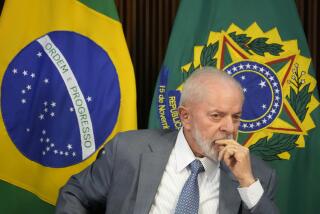Pro-Castro Campaign On in Brazil : Left Wing Hopes to Engineer Renewed Diplomatic Ties
- Share via
RIO DE JANEIRO — An intensive media campaign is under way here to muster public support for restoration of Brazil’s long-interrupted diplomatic relations with Cuba, with the most notable example being a two-hour interview with Cuban President Fidel Castro on national television.
Brazilian politicians, union leaders, intellectuals, television personalities and popular music stars have been traveling to Cuba in a steady stream and returning with favorable accounts of life under the Castro regime.
Castro’s Views in Book
Brazil’s “progressive” Roman Catholic sector has weighed in with a book expressing Castro’s views that Marxism and the Roman Catholic Church share an interest in the “liberation” of the poor from “capitalist exploitation.”
The book, based on interviews with Castro, is titled “Fidel and Religion” and was written by Frei Betto, a Brazilian Dominican priest who was jailed for four years for guerrilla activities here in 1968.
The interest in Castro and Cuba that is being stimulated by the Brazilian left is seen here as a way of pressuring President Jose Sarney to restore diplomatic relations with Cuba. Formal ties were suspended in 1964 after the military took power here and implemented an inter-American decision, inspired by the John F. Kennedy Administration, to impose economic and diplomatic sanctions on Cuba.
Maintained 20 Years
Over the years, other Latin American countries either ignored the boycott, as Mexico did, or stopped applying it, as Argentina did. But Brazil maintained the break throughout the 20 years of military regimes that ended here early this year.
Soon after taking office in March, Sarney ordered Brazil’s National Security Council to study the Cuban issue. Foreign Minister Otavo Setubal, a council member, said during a visit to Moscow earlier this month that a decision on restoration of ties with Cuba would be announced soon.
Sarney has not pushed for resumption of relations but instead has been responding to pressures from the left wing of the governing Brazilian Democratic Movement Party.
Normalization of Brazil’s diplomatic relations with Cuba would offer Brazil only minor economic benefits, since Cuba cannot pay for imports in convertible currencies and has no exports that interest Brazil, a far more developed industrial economy.
Not Under U.S. Thumb
But restored ties would show the world that Brazil has an “independent” foreign policy and is not under the thumb of the United States. Such a posture would provide some domestic political gains for Sarney with nationalist and pro-Castro sectors.
However, press reactions stirred up by Castro’s appearance Sunday night on a privately owned TV network indicate that there is still substantial Brazilian skepticism about whether renewed ties with Cuba would be advantageous for Brazil.
O Globo, Brazil’s leading afternoon newspaper, said in a front-page editorial that Castro is a “demagogue who rules with an iron hand and lamely tried to disguise his personal ambition with protestations of self-sacrifice for the people.”
Castro said in the television interview that there is no reason to hold elections in Cuba for a national government and no need for opposition parties. “That is a bad example for Brazil’s new democracy. Fidel is not in touch with the new times in Brazil,” Jornal do Brazil said in an editorial.
In the interview, Castro repeated his contention that Brazil and other major Latin American debtors should stop making payments to their creditors, mostly foreign banks, because the debts were incurred by “regimes that didn’t represent the will of the people.” Brazil is paying more than $12 billion this year in debt service payments and is trying to obtain refinancing of payments on principal coming due through 1987.
Not Desirable Strategy
Finance Minister Dilson Funaro said Castro’s proposal for a repudiation of debt is not a desirable debt strategy for Brazil. “What we want is for the debtors to put pressure on the creditors to reduce their interest rates so that we can pay,” Funaro said.
Castro declared his sympathy for Latin American democracies and denied that Cuba is trying to “export” revolution to Central America or any other Latin American country. But the Cuban leader predicted that social revolution is coming in these countries because, he charged, Latin America’s poor majorities are being obliged by “imperialism” to pay for foreign debts incurred for the benefit of “oligarchs.”
The television interviewer, Brazilian journalist Roberto D’Avila, did not challenge Castro on any of his allegations, and the Brazilian press widely criticized the questioning as simply providing a springboard for the Cuban president’s views.
More to Read
Sign up for Essential California
The most important California stories and recommendations in your inbox every morning.
You may occasionally receive promotional content from the Los Angeles Times.













